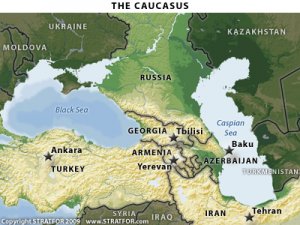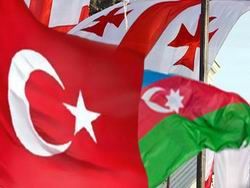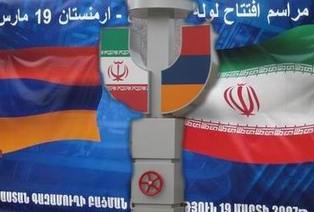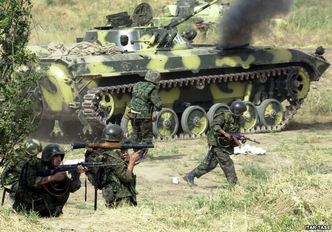 06.02.2014
06.02.2014IRAN SECURITY IN THE SOUTH CAUCASUS
Vladimir Yevseyev,Especially for Iran.ru
Currently, the security situation in the South Caucasus is determined by three main factors: the deep Syrian crisis, which can still lead to war the U.S. and its allies against Bashar al-Assad, Iran's nuclear problem and long-term consequences of the war in August 2008 with Georgia. The main consequence of the August war was temporary cessation of the NATO enlargement process in the South Caucasus. Russia's intervention has demonstrated a kind of "red line" and Washington's position, shift the responsibility for resolving the crisis in the European Union (EU) has defined the limits of the power of the alliance.
Inertness of Russia's foreign policy in 2009-2012. Relative success of NATO in Libya, who have come too far worsening of the crisis in Syria - all fueled the confidence of those Westerners who would like to "replay" history. In particular, it is possible to retry joining NATO in the South Caucasus, but in the framework of the Nagorno Karabakh issue. When this question may be raised on admission to the alliance not only Georgia, but also quite ambitious Azerbaijan. The situation is aggravated by the fact that the ruling elite of Azerbaijan strong feelings on power return of Nagorno-Karabakh. The reason for this may be, for example, the aggravation of the situation around the Iranian nuclear program. In these circumstances, Russia, Iran and Turkey are obliged to agree among themselves in order to prevent a possible war in the South Caucasus. This can be done through a new regional security system to be established regardless of affiliation of the parties to any military-political bloc. Otherwise, you may experience a regional war with unpredictable consequences.
Another reason, which is pushing to establish in this region of the new system of regional security due to the fact that in the South Caucasus, as well as the Middle East significantly weakened U.S. influence. Hence, there is a geopolitical vacuum that is filled with regional players. Otherwise it may increase the activity of various kinds of radical organizations that continue to receive significant financial support from the Arabian monarchies.
 First need to create a new regional security system felt in Ankara. As a consequence, August 11, 2008, Turkey proposed to Azerbaijan, Georgia and Armenia under the guarantee of Russia and Turkey to create a "Platform for Stability and Cooperation in the Caucasus", which was called the Caucasus Pact. Platform will not search for mutually acceptable solutions to all problems of Nagorno-Karabakh, Abkhazia and South Ossetia, which has been a problem, and the alignment of policies of mutual coexistence of the two formed a military-political alliances: Russia and Armenia (including the new de facto independent states), on the one hand , Turkey, Azerbaijan and Georgia - the other. It is obvious that the proposed Ankara strategy reflects its desire for regional leadership, which is supported by good reasons. Thus, the size of the gross domestic product (GDP) Turkey ranks second after Russia (in 2012 the size of its GDP was 1125 billion dollars), and in terms of population and the armed forces (AF) - the third after Russia and Iran. At the end of 2013 Turkey's population was about 76 million., And the number of sun exceeded 500 thousand soldiers.
First need to create a new regional security system felt in Ankara. As a consequence, August 11, 2008, Turkey proposed to Azerbaijan, Georgia and Armenia under the guarantee of Russia and Turkey to create a "Platform for Stability and Cooperation in the Caucasus", which was called the Caucasus Pact. Platform will not search for mutually acceptable solutions to all problems of Nagorno-Karabakh, Abkhazia and South Ossetia, which has been a problem, and the alignment of policies of mutual coexistence of the two formed a military-political alliances: Russia and Armenia (including the new de facto independent states), on the one hand , Turkey, Azerbaijan and Georgia - the other. It is obvious that the proposed Ankara strategy reflects its desire for regional leadership, which is supported by good reasons. Thus, the size of the gross domestic product (GDP) Turkey ranks second after Russia (in 2012 the size of its GDP was 1125 billion dollars), and in terms of population and the armed forces (AF) - the third after Russia and Iran. At the end of 2013 Turkey's population was about 76 million., And the number of sun exceeded 500 thousand soldiers.
By basing its policy in the Caucasus, Turkey considers that in the case of armed conflict is seriously hurt its status as a transit country for energy resources. So, in August 2008 the British company British Petroleum were twice reduced volumes of pumping oil through the Baku - Tbilisi - Ceyhan (to 12.4 million barrels). A similar decrease occurred in respect of the Baku - Supsa pipeline and the Baku - Tbilisi - Erzurum. As a result, Azerbaijan has been forced to increase oil exports to Russia and start selling gas to Iran. But there are alternative delivery routes to Europe hydrocarbons. In particular, it has started the construction of the gas pipeline "South Stream", which will be held in Europe bypassing Turkey across the Black Sea. In such circumstances, Turkey will have to think of ensuring its energy security, as now, the Turkish market is 75% dependent on energy imports, and according to experts, by 2020, this figure will increase to 85%.
 At the same time of a regional security system was quite artificially derived Iran, which has no less reason for Turkey's regional leadership. Moreover, in a closed Armenian-Azerbaijani and Armenian-Turkish border and sophisticated Russian-Georgian relations, Iran is largely Armenia's only window to the outside world. As a consequence, between Tehran and Yerevan fast enough economic cooperation develops. So, in late 2008 began delivery in Armenia Iranian natural gas through Tabriz - Megry - Qajaran - Ararat capacity to 2.6 billion cubic meters. meters of gas per year. Payment for the supply of the product gas is carried out in the Islamic Republic of Iran (IRI) of electricity. The total cost of the project, which has participated in the implementation of the Russian company "Gazprom", was $ 250 million previously Armenia receives natural gas from Russia via Georgia.Between Armenia and Iran are two high-voltage power lines, through which the seasonal vzaimoperetoki electricity. Planned construction of another such line voltage of 400 kV. The cost of this project is approximately 100 million euros. Between countries built one and built two more modern highways, signed an agreement on laying of Iran-Armenia railway. According to preliminary data, the latter amount to 1.8 billion dollars, of which 1.4 billion will provide Iran, and the rest - JSC "Russian Railways". Implementation period of the project is five years. Reached an agreement on the participation of OAO "Gazprom" in the construction of Iran-Armenia oil pipeline and terminal liquid fuel capacity to 1.5 million tons, which is essential for the country's energy security. Within the framework of bilateral cooperation is planned construction of Meghri HPP. The cost of these projects is approximately $ 500 million
At the same time of a regional security system was quite artificially derived Iran, which has no less reason for Turkey's regional leadership. Moreover, in a closed Armenian-Azerbaijani and Armenian-Turkish border and sophisticated Russian-Georgian relations, Iran is largely Armenia's only window to the outside world. As a consequence, between Tehran and Yerevan fast enough economic cooperation develops. So, in late 2008 began delivery in Armenia Iranian natural gas through Tabriz - Megry - Qajaran - Ararat capacity to 2.6 billion cubic meters. meters of gas per year. Payment for the supply of the product gas is carried out in the Islamic Republic of Iran (IRI) of electricity. The total cost of the project, which has participated in the implementation of the Russian company "Gazprom", was $ 250 million previously Armenia receives natural gas from Russia via Georgia.Between Armenia and Iran are two high-voltage power lines, through which the seasonal vzaimoperetoki electricity. Planned construction of another such line voltage of 400 kV. The cost of this project is approximately 100 million euros. Between countries built one and built two more modern highways, signed an agreement on laying of Iran-Armenia railway. According to preliminary data, the latter amount to 1.8 billion dollars, of which 1.4 billion will provide Iran, and the rest - JSC "Russian Railways". Implementation period of the project is five years. Reached an agreement on the participation of OAO "Gazprom" in the construction of Iran-Armenia oil pipeline and terminal liquid fuel capacity to 1.5 million tons, which is essential for the country's energy security. Within the framework of bilateral cooperation is planned construction of Meghri HPP. The cost of these projects is approximately $ 500 million
On the essential relationship between the approximation of Iran and Georgia signed testifies November 3, 2010 an agreement on visa-free border crossing, which entered into force on 26 January next year. Now the citizens of both countries can travel to each other for up to 45 days without a visa. In addition, the opening of the General Consulate of Iran in Batumi and resumed direct flights between Tbilisi and Tehran, which was interrupted in 2000. By Georgia contributed to this not so much an increase in two and a half times the number of Iranian tourists or expectation of large investments, as the actual rejection of Iran to recognize the independence of Abkhazia and South Ossetia, some cooling under President Ahmadinejad, Russian-Iranian relations and the fact of living in Iran at least 300 thousand Georgians. However, the Iranian-Georgian trade remains low, which creates an imbalance in the development of bilateral relations. This is compounded by the lack of common borders and the preservation of intractable differences in culture, religion and language. In addition, as the U.S. military-political and financial support of the Georgian leadership hinder the development of such relations.
 Thus, the security situation in the South Caucasus remains extremely difficult and hazardous. At the same time Russia and Turkey may be drawn into the armed Armenian-Azerbaijani conflict, there is a possibility of a major war in the Middle East, which could, for example, to affect significantly the internal situation in Turkey as well as in the medium term - of Israel's air strikes on Iranian nuclear and military installations. U.S. and its allies may try to oust Russia and Iran from the region under consideration, so you must use all the means at Moscow and Tehran political and diplomatic means to prevent U.S. military aggression and their allies against Syria, Azerbaijan hold war over Nagorno-Karabakh, and Israel - from military solution of the Iranian issue.
Thus, the security situation in the South Caucasus remains extremely difficult and hazardous. At the same time Russia and Turkey may be drawn into the armed Armenian-Azerbaijani conflict, there is a possibility of a major war in the Middle East, which could, for example, to affect significantly the internal situation in Turkey as well as in the medium term - of Israel's air strikes on Iranian nuclear and military installations. U.S. and its allies may try to oust Russia and Iran from the region under consideration, so you must use all the means at Moscow and Tehran political and diplomatic means to prevent U.S. military aggression and their allies against Syria, Azerbaijan hold war over Nagorno-Karabakh, and Israel - from military solution of the Iranian issue.
Given Ankara's interest in creating a new regional security system, it is desirable in the near future to hold trilateral talks between Russia, Iran and Turkey to develop common approaches to resolving conflict in the region. This allows us to formulate a new concept, nonaligned regional security system. As a result, not only will be able to avoid a new war in the South Caucasus, but also to create a favorable environment for the resolution of problems of Nagorno-Karabakh, Abkhazia and South Ossetia.
Return
